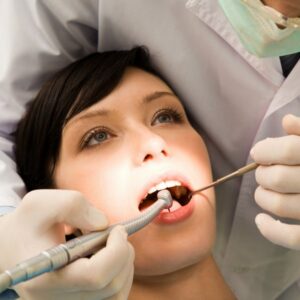Can You Brush Your Teeth Too Hard?
Can Brushing Your Teeth Too Hard Cause Damage?
Brushing our teeth is one of the first things we learn as a child.
It’s one of the first things, if not the very first thing that we do, to take care of ourselves and our health.
It’s not always pretty, and when we first start brushing more toothpaste ended up on our shirts than on our teeth, but we did it.
We were taught the essentials of oral hygiene at a very young age. We might have been running around in pull-ups, but we were brushing our teeth too.
We did it twice a day (hopefully), and we learned all the little tricks.
Say the alphabet twice while you brush, so you know you’ve brushed long enough.
Divide your mouth into four sections to be sure you hit every tooth in your mouth.
Eventually, we learn about flossing and mouthwash.
However, with all we learn, there seems to be one thing that many people are still unaware of, even as adults.
How hard are we supposed to brush our teeth?
Can we brush too hard, or should you put as much “elbow grease” into cleaning your teeth as you do with everything else?
Should we treat our smiles like we do our cars and scrub as hard as we can until it sparkles?
Let’s explore that question and more in the article below.
Table Of Contents
- Can You Brush Too Hard?
- Hold On Loosely
- Signs You Are Brushing Too Hard
- Receding Gums
- Sensitive Teeth
- Teeth Are Darker Near Your Gums
- Your Gums Bleed When You Brush
- How To Prevent Brushing Your Teeth Too Hard
- Use a Toothbrush With Soft Bristles
- Hold Your Toothbrush With Three Fingers
- Use An Electric Toothbrush
- What Do You Do If You Have Been Brushing Too Hard?
- Hylan Dental
Can You Brush Your Teeth Too Hard?
It turns out you absolutely can brush our teeth too hard.
We should not approach cleaning our teeth the same we approach cleaning anything else. Unlike scrubbing our bathroom floors with force, scrubbing our teeth with excess force will do damage.
In this case, the saying “killing with kindness” is actually very literal.
It might seem strange because our teeth are hard, but the gums that surround them are not.
It’s important to clean along the line where your teeth meet your gums, but brushing it too hard or with a toothbrush that’s too firm can do more harm than good.
This can wear away the thin top layer of your gum, causing more problems to arise.
Hold On Loosely
One of the goals of brushing our teeth is to remove the plaque, which is the white or cream-colored sticky material on our teeth that will cause decay if it’s not taken care of.
Some people take this so seriously, they even take a toothbrush to their workplace (which isn’t a bad idea).
There’s a common misconception that the harder you brush, the better your chances are of removing the plaque.
However, plaque is actually pretty soft, so it’s not necessary to brush with excessive force or pressure. Brushing harder won’t remove more plaque, it will just damage your gums.
Plaque is often confused with tartar which builds up when plaque sits for too long on your teeth.
If you don’t brush properly or frequently enough, plaque can turn into tartar in about a week.
But, tartar can only be removed by a dentist, so there’s still no reason to brush your teeth any harder.
Signs You’re Brushing Too Hard
Now that we know it’s possible to brush our teeth too hard, how can do we know if we’ve been doing it?
Here are four signs to look out for to see if you’ve been brushing too hard all along:
- Your Gums Are Receding: If it looks like your gums are receding, or that there’s been a change in your gum line, there’s a good chance you’ve been brushing too hard. Receding gums are a telltale sign that you’re applying a little too much pressure when you brush.
- Your Teeth Start To Feel More Sensitive: Certain parts of your teeth may start to feel more sensitive than other parts. This is because when your gums start to recede due to brushing too hard, parts of your teeth are exposed that had been covered up until that point.
- Your Teeth Are Darker Near Your Gums: Your teeth are a darker shade under your gums because those underlying root surfaces don’t have enamel on them. When your gums start to recede, your teeth will seem less and less white the further you go into your root surface.
- Your Gums Bleed When You Brush: One of the most common signs of aggressive brushing is bleeding gums. It’s not normal for your gums to bleed when you brush your teeth. Along with brushing too hard, bleeding gums are also a sign of gingivitis and poor overall oral hygiene. If your gums seem to bleed or become swollen every time you brush, it’s a sign you need to be more gentle while you brush.
How To Prevent Brushing Your Teeth Too Hard
Is stopping yourself from brushing too hard as easy as lightening up on the pressure when you’re brushing? Yes and no.
Here are 3 actions you can take to ensure that you don’t brush with too much power.
- Use A Toothbrush With Soft Bristles: Some people prefer the feel of medium to hard bristles, but they can actually damage your gums and cause even more gum recession. A simple way to prevent this is to swap your toothbrush out for one with soft bristles.
- Hold Your Toothbrush With Three Fingers: Using only three fingers to hold your toothbrush will reduce the pressure of the toothbrush on your gums. Again, you do not need to press very hard to get your teeth clean. By allowing just the tips of the bristles to do the work, your brushing will be more effective.
- Use An Electric Toothbrush: If used correctly, electric toothbrushes are a great way to prevent gum damage because all you need to do is guide the brush over your teeth. If you use an electric toothbrush, be sure not to use the traditional back and forth method to brush, because these motions combined with the power of the toothbrush can wear your gums away.
What Do You Do If You’ve Been Brushing Too Hard?
If you have any of the symptoms above that align with brushing your teeth too hard, don’t worry. There’s rarely anything that can’t be fixed.
The first thing you need to do is follow the steps to keep yourself from brushing them too hard moving forward.
Prevention is always the best medicine.
But if damage has already been done, and your gums are receding or bleeding, or your teeth are sensitive in certain spots, you should visit your dentist.
Your dentist will evaluate the damage, and decide the course of action to get your mouth back in shape.
If you don’t currently have a dentist, the dentists at Hylan Dental Care can fix you right above.
They have years of experience and expertise fixing and preventing many oral hygiene issues, and they can definitely help you with yours.


